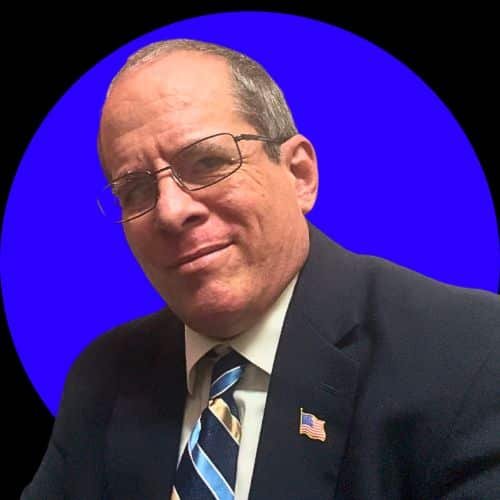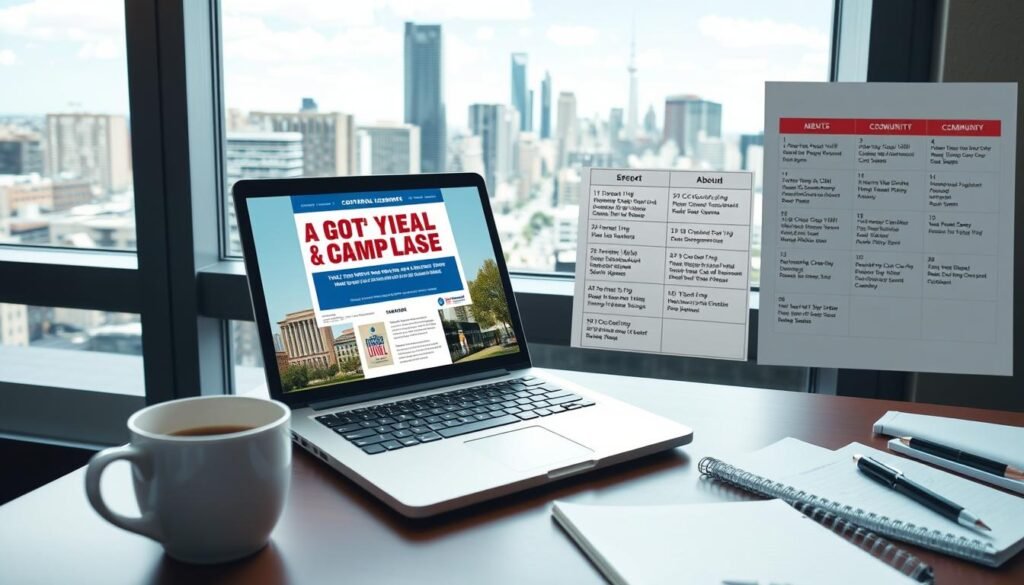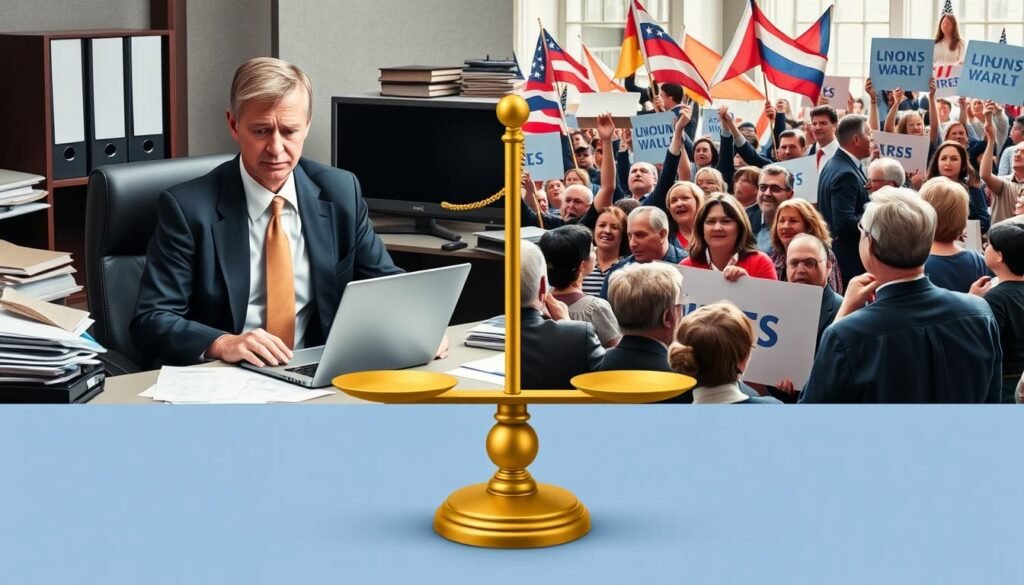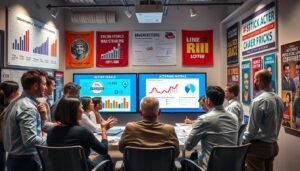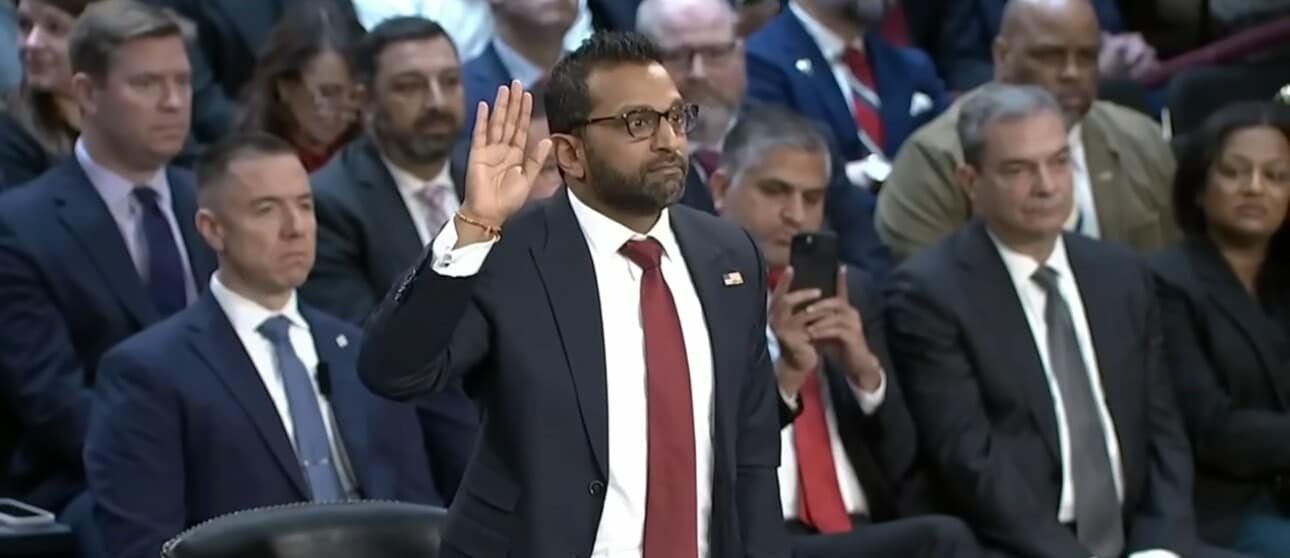How to Get Into Politics While Working a Full-Time Job
Many people dream of a career in politics, even while working full-time. There are many full-time policy jobs, like the internship at the Office of U.S. Senator Kirsten Gillibrand. This job is paid and full-time. This article will guide you on how to start a career in politics while keeping your current job.
Getting into politics can be tough, but it’s doable with the right help. Many want to work in public policy but don’t know where to begin. This article will help you find and apply for policy jobs. It will also show you how to manage a political career with a full-time job.
Key Takeaways
- Understanding the path to political involvement is key for a successful career in politics.
- Knowing your political goals and how much time you can commit is vital for balancing work and politics.
- Volunteering for a campaign or joining a local group is a great first step.
- Working a full-time job and pursuing politics requires careful planning and time management.
- Focus on political involvement and career goals for a rewarding and challenging career.
- Getting into politics while working full-time needs dedication and hard work.
- Building a strong political foundation and understanding career needs is essential.
Understanding the Path to Political Involvement
Getting into politics can be very rewarding. But, you need to know the different ways to get involved. For those with full-time jobs, part-time politics is a good start. This means volunteering, going to local meetings, or joining groups.
By doing this, you can help out while keeping your job. It’s a way to make a difference and keep your career going.
Different Types of Political Engagement
There are many ways to get involved in politics. You can try internships, fellowships, or even graduate school. These can give you valuable skills and experience.
Some examples of getting involved include:
- Volunteering for a campaign
- Attending local government meetings
- Joining a community organization
Assessing Your Political Goals
Before diving into politics, think about your goals. Figure out how much time you can give. This will help you choose the right way to get involved.
Building Your Political Foundation
To make a mark in politics, getting involved in political activism is key. This means volunteering, campaigning, and organizing in your community. Running for office is also impactful, but it demands thorough planning and a deep grasp of politics.
Mastering community leadership is vital for a strong political base. You can do this by joining local projects, going to community events, and working with other leaders. This way, you gain experience, expand your network, and boost your political prospects.
Here are some ways to dive into political activism and community leadership:
- Volunteering for a political campaign or cause
- Participating in local advocacy groups or organizations
- Attending community events, such as town hall meetings or rallies
- Collaborating with other leaders to drive positive change
By following these steps and engaging in running for office or other political activities, you can lay a solid foundation. This will help you make a real difference in your community.
| Activity | Description |
|---|---|
| Volunteering | Supporting a political campaign or cause by donating time and effort |
| Community Organizing | Bringing people together to drive positive change and address social issues |
| Running for Office | Seeking election to a political position, such as a local council or national office |
Managing Your Professional and Political Life
When people chase their political aspirations, they often struggle to balance work and politics. It’s key to make a schedule that fits both. Also, setting clear limits at work helps keep political dreams alive without hurting your job.
Those in public policy often have careers that zigzag between jobs and groups. This shows how vital civic engagement and flexibility are. Using your work skills in politics can boost your career. This could mean networking, raising funds, or campaigning.
To find a balance, it’s important to focus on what needs to be done, manage your time well, and set clear limits. Here’s how:
- Make a schedule that has time for work and politics.
- Set clear boundaries with colleagues and bosses to avoid conflicts.
- Use your work skills to help your political goals, like marketing for a campaign.
By using these tips, you can manage your work and politics well. This way, you can chase your political aspirations while keeping your job.
Getting Started in Local Politics
To start in local politics, you need strong community leadership skills. You also need to understand the issues in your community. You can do this by going to local government meetings, joining community groups, and making friends in your neighborhood.
Here are some ways to get involved in local politics:
- Join a local community group or volunteer organization
- Attend city council meetings or town hall events
- Participate in local advocacy campaigns or initiatives
By doing these things, you can grow your political aspirations. You can also make a difference in your community through civic engagement. Always stay updated on local issues. Work on being seen as a dedicated and passionate person who wants to help.
| Organization | Meeting Schedule | Contact Information |
|---|---|---|
| Local Community Group | Monthly, 2nd Thursday | email: info@localcommunitygroup.org |
| City Council | Bi-Weekly, Mondays | phone: 555-555-5555 |
Developing Your Political Network While Employed
Building a strong network is key for a career in politics. Working full-time makes it hard to find time for political involvement. But, with a smart plan, you can build a network of political professionals.
Start by going to industry events, joining groups, and connecting on social media. This will help you meet people in the field.
A part-time politics role is a good starting point. Attend conferences or join online forums related to your field. This keeps you updated on job chances and shows you’re dedicated.
Some important stats to keep in mind when building your network include:
- Over 7,386 state legislative seats are available across the United States.
- Federal elections have 535 seats in Congress.
- Campaigns can vary in size dramatically, from small local efforts to large federal operations.
Understanding these stats and building a strong network can lead to success in your career in politics. Always make time for political involvement and part-time politics activities.
How to Get Into Politics While Working a Full-Time Job: Essential Steps
To get into politics while working full-time, you need a plan. Start by joining a political party, volunteering, and becoming a community leader. This will help you grow your skills and network.
First, find your strengths and passions. Then, use them in politics. Volunteer for local campaigns or join a party to learn and meet people.
Starting with Party Involvement
Joining a political party is a smart first step. It opens doors for networking, volunteering, and learning about politics.
Volunteer Opportunities
Volunteering for campaigns or organizations is another good way to get involved. It helps you gain experience, build your network, and help your community.
Building Your Platform
Being a thought leader in your community is key for a political career. Create an online presence, engage with your community, and have a clear message and vision.
By following these steps, you can enter politics while working full-time. You’ll make progress in your political career and involvement.
Digital Political Engagement Strategies
In today’s digital age, civic engagement and political activism are more accessible than ever. Social media, online campaigning tools, and virtual networking events make it easy to get involved in politics. For those thinking about running for office, having a strong online presence is key.
Some key digital political engagement strategies include:
- Building a social media presence to connect with voters and share your message
- Utilizing online campaigning tools to manage your campaign and reach a wider audience
- Attending virtual networking events to meet other politicians and stay informed about current events
Recent statistics show that 69% of adults aged 18-29 get news from social media. Also, 54% of adults in the same age group use social media to find out about rallies or protests. Using these digital channels can boost civic engagement and impact political activism.
Embracing digital strategies can help individuals start their journey to running for office. With the right tools and techniques, anyone can become a successful politician and have their voice heard.
| Age Group | Percentage of Adults Getting News from Social Media |
|---|---|
| 18-29 | 69% |
| 30-49 | 47% |
| 50-64 | 34% |
| 65+ | 20% |
Financial Planning for Political Activities
People with political aspirations need a good financial plan. This helps with civic engagement and community leadership. They must make a budget, look for funding, and build a donor network.
Understanding costs is key. This includes campaign expenses, event costs, and staff pay. Finding funding sources like grants, donations, and sponsorships is also important.
- Make a detailed budget and track spending
- Build a wide network of donors and supporters
- Look for funding like grants and sponsorships
- Plan financially for the long term to support ongoing activities
Good financial planning helps support political aspirations and community leadership. It ensures a stable financial base. This boosts civic engagement and impact.
| Financial Planning Strategies | Benefits |
|---|---|
| Creating a detailed budget | Helps track expenses and stay organized |
| Building a diverse network of donors | Provides access to a broader range of funding sources |
| Exploring funding options | Identifies possible grants and sponsorships |
Legal Considerations for Working Professionals in Politics
Working professionals with political aspirations need to know the legal rules for political activity. The Hatch Act, for example, stops federal employees from doing partisan work on duty or using federal property. It divides employees into two groups: “less restricted” and “further restricted,” each with its own rules.
“Less restricted” employees can join partisan campaigns off-duty and outside federal buildings. But “further restricted” employees, like SES employees, face stricter rules. Knowing these laws is key to balancing work and politics without legal trouble.
To follow these laws, professionals must understand the rules for civic engagement and political actions. This includes knowing about campaign finance, workplace rules, and avoiding conflicts of interest. Being informed helps professionals move through politics without harming their careers.
- Understand the Hatch Act and its implications for federal employees
- Know the rules and regulations that govern civic engagement and political activity
- Be aware of campaign finance laws and workplace political activity regulations
By following these steps, professionals can keep their political aspirations from hurting their jobs. They can balance work and politics well.
Creating Your Political Action Plan
To succeed in your career in politics, you need a solid plan. It should cover both short-term and long-term goals. This plan should match your political involvement and interests, whether you’re aiming for a full-time or part-time politics role.
When making your plan, think about these steps:
- Set clear, measurable, and reachable short-term goals, like volunteering for a local campaign or going to a political event.
- Work on a long-term strategy that fits your career dreams, including growing your professional network and getting the right experience.
- Find ways to measure success, like tracking your network growth or boosting your political involvement in your area.
Stay focused and keep your motivation up. Be ready to change your plan as you move forward in your career in politics. With a detailed plan and dedication to your goals, you can succeed in your part-time politics career. You’ll also make a real difference in your community.
Conclusion: Taking Your First Steps into Politics While Maintaining Your Career
Starting your journey to get into politics while working a full-time job is exciting. It’s possible to balance your political dreams with your job. Use your skills, build a network, and manage your time well to advance your career in politics and keep your job.
Political involvement doesn’t mean giving up everything. Begin with small steps like local projects, volunteering, or joining groups. As you grow, increase your role, keeping your work and personal life in check. With hard work and a smart plan, you can excel in both politics and your job.
FAQ
What are the different types of political engagement?
How can I assess my political goals and time commitment?
How do I build a political foundation while working a full-time job?
How can I manage my professional and political life effectively?
What are the steps to get started in local politics?
How can I develop my political network while employed?
What are the essential steps to get into politics while working a full-time job?
What are some digital political engagement strategies?
How do I plan financially for my political activities?
What legal considerations should I be aware of as a working professional in politics?
How do I create an effective political action plan?
Source Links
- Senate Employment Bulletin
- Job Opportunities | County of Orange Careers
- How to run a successful political campaign in 7 steps – NGP VAN
- Politics at Work: Managing Political Talk in the Workplace
- 10 ways to get involved in politics: how to change the world around you – CCCG
- How To Talk About Politics in the Workplace
- How to run a grassroots political campaign – NGP VAN
- How to Keep a Workplace Happy in a Divided Political Moment
- Practical Policies for Politics: Some Guidelines for Managing Political Conflict in the Workplace
- Students & Recent Graduates
- Home – Careers
- Political campaigning | Emerging Technology Policy Careers
- 5 Ways to Navigate Political Discourse at Work | HRMorning
- Leading the DNC Forward — Ben Wikler
- Job Opportunities | King County Careers
- Advocacy and Activism Online – The Digital Wellness Lab
- How Political Organizations Use Digital Marketing and Email Marketing to Influence Public Opinion and Drive Action
- Full-time policy roles | Emerging Technology Policy Careers
- Engineering school at 30 [working full time job + family responsibilities]
- Political Activities
- Talking Politics at Work: A Double-Edged Sword
- How To Get Volunteers For Political Campaign: Step-By-Step Plan With Tips
- Guidelines for Political Campaigns and Ballot Initiatives
- Politics in a California Workplace
- 5 Steps to Creating Effective Training Programs | Explorance
- Internships
- BA (Hons) Politics


